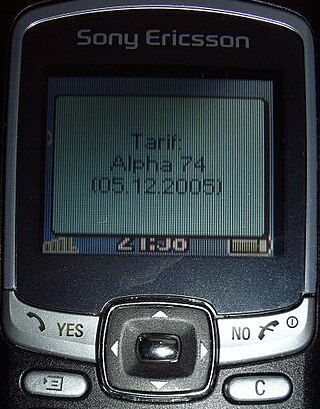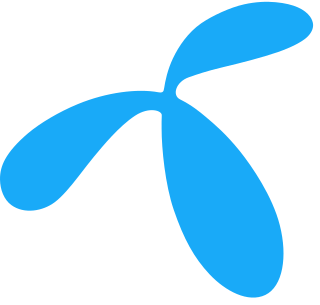
A SIM card is an integrated circuit (IC) intended to securely store an international mobile subscriber identity (IMSI) number and its related key, which are used to identify and authenticate subscribers on mobile telephone devices. Technically the actual physical card is known as a universal integrated circuit card (UICC); this smart card is usually made of PVC with embedded contacts and semiconductors, with the SIM as its primary component. In practice the term "SIM card" is still used to refer to the entire unit and not simply the IC.
A SIM lock, simlock, network lock, carrier lock or (master) subsidy lock is a technical restriction built into GSM and CDMA mobile phones by mobile phone manufacturers for use by service providers to restrict the use of these phones to specific countries and/or networks. This is in contrast to a phone that does not impose any SIM restrictions.

The International Mobile Equipment Identity (IMEI) is a numeric identifier, usually unique, for 3GPP and iDEN mobile phones, as well as some satellite phones. It is usually found printed inside the battery compartment of the phone but can also be displayed on-screen on most phones by entering the MMI Supplementary Service code *#06# on the dialpad, or alongside other system information in the settings menu on smartphone operating systems.

Unstructured Supplementary Service Data (USSD), sometimes referred to as "quick codes" or "feature codes", is a communications protocol used by GSM cellular telephones to communicate with the mobile network operator's computers. USSD can be used for WAP browsing, prepaid callback service, mobile-money services, location-based content services, menu-based information services, and as part of configuring the phone on the network. The service does not require a messaging app, and does not incur charges.

A prepaid mobile device, also known as a pay-as-you-go (PAYG), pay-as-you-talk, pay and go, go-phone, prepay or burner phone, is a mobile device such as a phone for which credit is purchased in advance of service use. The purchased credit is used to pay for telecommunications services at the point the service is accessed or consumed. If there is no credit, then access is denied by the cellular network or Intelligent Network. Users can top up their credit at any time using a variety of payment mechanisms.

Grameenphone, widely abbreviated as (d/b/a) GP, is the leading telecommunications service provider in Bangladesh. As of December 2023, its subscribers span over 82.20 million. It is a joint venture between Telenor and Grameen Telecom Corporation. Telenor, a telecommunication company from Norway, owns a 55.8% share of Grameenphone, Grameen Telecom owns 34.2% and the remaining 10% is publicly held.
Mobile identity is a development of online authentication and digital signatures, where the SIM card of one's mobile phone works as an identity tool. Mobile identity enables legally binding authentication and transaction signing for online banking, payment confirmation, corporate services, and consuming online content. The user's certificates are maintained on the telecom operator's SIM card and in order to use them, the user has to enter a personal, secret PIN code. When using mobile identity, no separate card reader is needed, as the phone itself already performs both functions.
The Internet in Croatia became a reality in November 1992 when the first international connection linking Zagreb and Vienna became operational.

Asda Mobile is a mobile virtual network operator (MVNO) in the United Kingdom operated by Asda and using the Vodafone network. Asda Mobile is available in over 360 stores across the UK and online through purchasing either a SIM card or through an Asda Mobile handset.
Social commerce is a subset of electronic commerce that involves social media and online media that supports social interaction, and user contributions to assist online buying and selling of products and services.
Tuenti Technologies, S.L.U is a mobile virtual network operator (MVNO) that operates with the Tuenti brand owned by Telefónica. It is a Spain-based tech company that focuses on providing a cloud-based services through its own application and its website to their customers.
Family Mobile was a mobile virtual network operator (MVNO) in the United Kingdom that was operated by Coms Mobile and used the EE network. Originally launched as IKEA Family Mobile on 8 August 2008, it offered pay as you go SIM cards to the public, with members of its loyalty programme and all 9,500 IKEA staff in Britain presented with a handset and £5 worth of free calls.
Telecommunications in Croatia covers fixed and mobile telephones, radio, television, and the Internet.
The term box breaker pertains to the mobile phone industry; where there are companies or individuals that exploit the networks' use of discounts on handsets to create their own profitable business.

HTC Hero is the third phone manufactured by HTC running the Android platform, announced on June 24, 2009 in London.
ForgetMeNot Africa was created in 2009, when ForgetMeNot Software joined forces with investment company Lonzim Plc to create ForgetMeNot Africa, a subsidiary that's solely focused on providing unified messaging and financial services in Africa, and began deploying its technology on the continent that same year, in Lesotho. Lonzim Plc owns 51% of ForgetMeNot Africa and ForgetMeNot Software own the remainder of the company.

Upptalk was a proprietary voice-over-IP service and software application that provided mobile phone numbers in the cloud and allows users to call or text any phone for free whether or not the device receiving the calls and texts has the Yuilop application. The service was discontinued in 2017 and even its domain was abandoned.
Facebook Zero is an initiative undertaken by social networking service company Facebook in collaboration with mobile phone-based Internet providers, whereby the providers waive data (bandwidth) charges for accessing Facebook on phones via a stripped-down text-only version of its mobile website. The stripped-down version is available online only through providers who have entered the agreement with Facebook. Photos are not loaded by default. Users may still choose to view them by clicking through but regular data charges apply to photo use.

Forum.hr is the largest and one of the oldest Croatian general-purpose internet forums. It was launched in 1999 by Željko Anderlon. It originated as a section of the website Monitor.hr, but was eventually singled out with its own domain in 2003. As of August 2017, the forum has nearly 504,000 registered users with nearly 50 million messages. The forum most frequently attracts highly educated individuals, between 18 and 35 of age.

Visible by Verizon is a prepaid cell phone service owned and operated wholly by Verizon Communications. Visible competes primarily against T-Mobile's Metro by T-Mobile, AT&T's Cricket Wireless and Dish's Boost Mobile as part of the prepaid wireless service provider brands.










